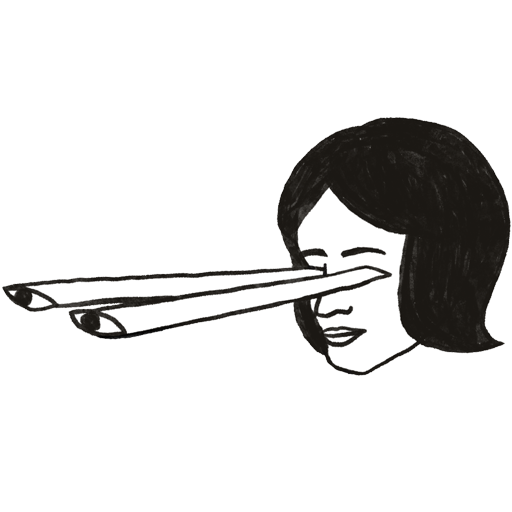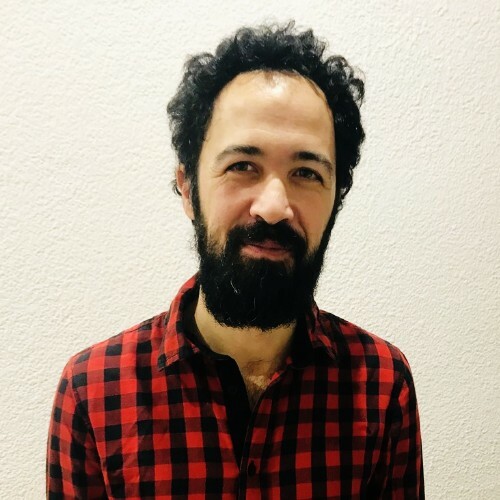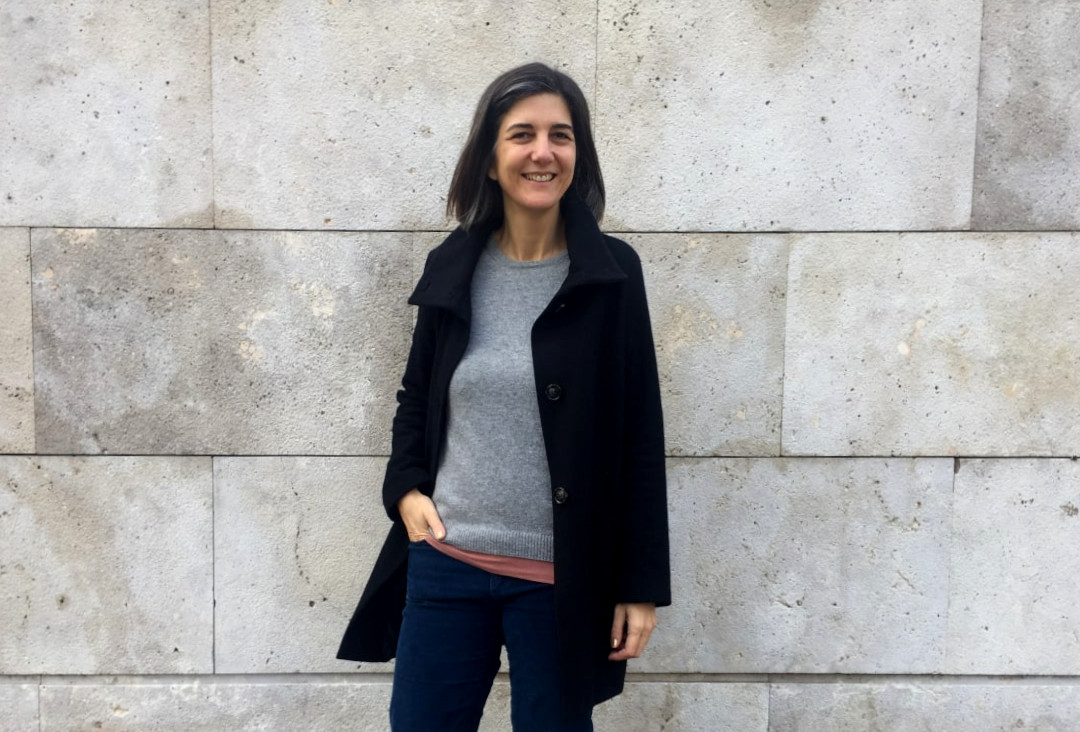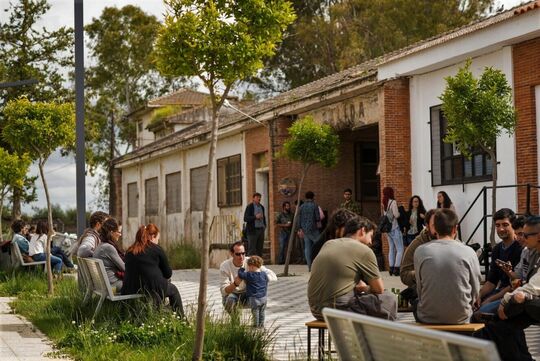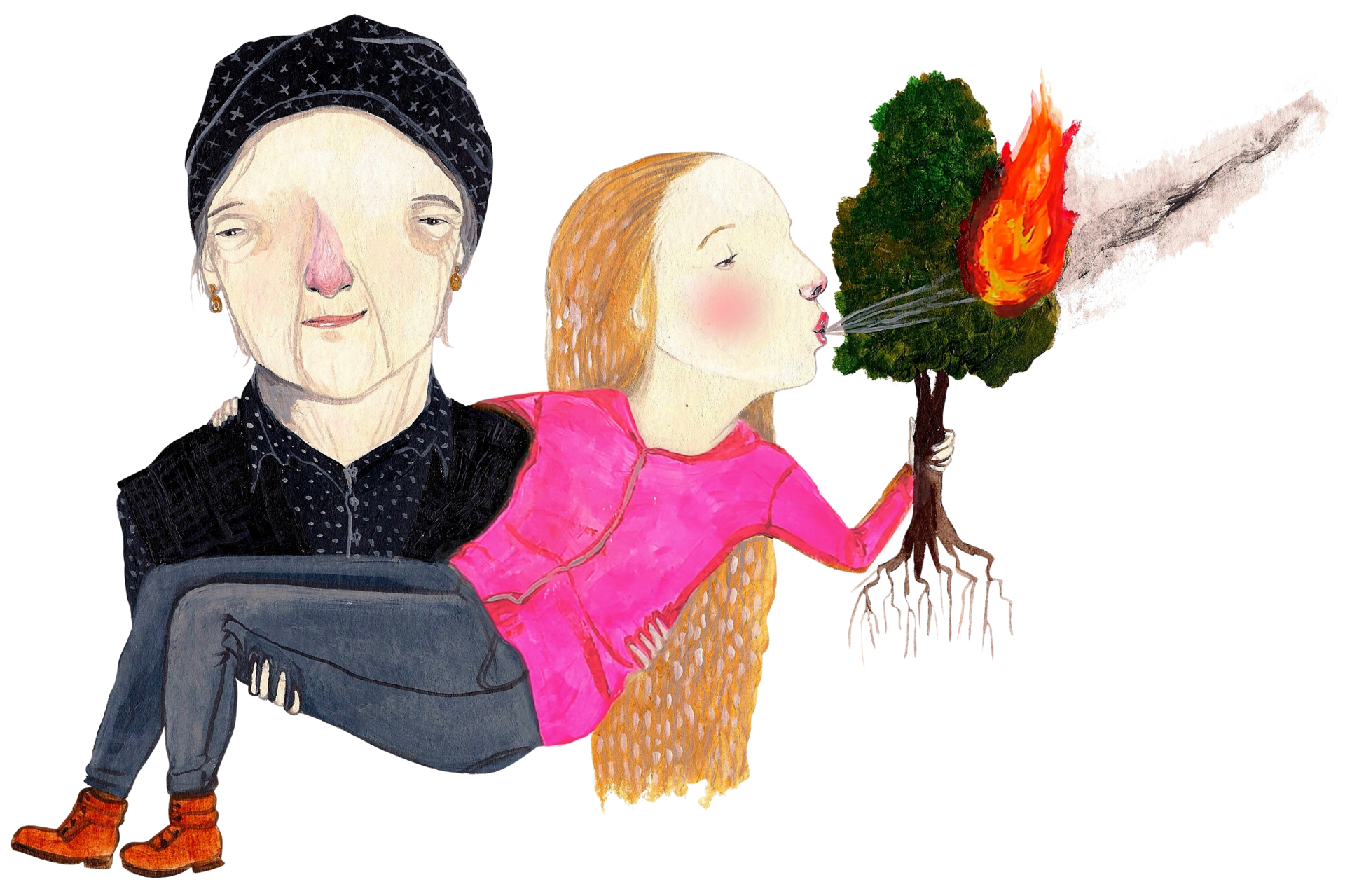
My great grandmother used to say: “The whole village goes to fire and to wedding.” I never knew if he meant that with the chimney burning in winter there was always a visit to warm up at home… or that in a fire community solidarity was activated to extinguish it. I want to believe that he was referring to both situations, well Galician was. We will talk about all of them in this article.
It is as surprising as disconcerting to repeat a mistake when we think we know the cause, so having to regret every summer as the flames devour forests, fields and houses is really sad. As the Pau Costa Foundation reminds us, fire is a phenomenon present in nature and, in a controlled way, is a tool. We use it for cooking, heating, manufacturing tools… What is happening in our forests so that an element that was once our ally is now our enemy? At what time have we gone from using fire in our favor to having to protect ourselves from fire?
In the drafting of Fundación Goteo we were talking about it and we defined three concepts (fire, fire and town). We wanted to understand their relationship and decided to contact who could explain. Believers to the core in mutual support, we pulled the agenda and asked for help from three groups that had campaigned on our platform: Civio, Rebrotem y Proxecto Batefogo.
All of them responded affirmatively, giving us joy, renewing our faith in the community and making possible the article you are going to read. Hopefully you find it equally interesting and revealing.
Firefighting is the answer, but not the solution
Almost always, a single question raises several questions and these have multiple answers. If in this case the fire is the question, we could present each of these groups through the question they raised and the answer they gave.
Fundación Ciudadana Civio asked: Are forest fires an inevitable lottery? To which they responded with the creation of the website: España en Llamas where you can see on a map the forest fires of 100 hectares or more occurred between 2001 and 2015, as well as a selection of brief news highlights.
With these data they have been researching and trying to answer for years:
- Who are to blame for the fires and what happens to them
- How much is spent on prevention or extinction
- If the Spanish mountains are cared for or if their poor condition helps spread the flames
- If the fire is used illegally to requalify the land
- If the law is followed to prevent fires
Editorial Catro Ventos and Proxecto Batego questioned: Is there any gender bias in the decisions and tasks carried out for the extinction of fires? To respond, they decided to edit and bring to light “Trees that do not burn. Women in forest fires prevention”, a collective publication that brings together experiences of activism, daily work and teaching resources as well as illustration and poetry to raise awareness of the decisive role of women in the prevention of fires and the management of mountains n the territory of Galicia and Portugal.
Finally, Rebrotem questioned the whole society: How can we respond effectively from solidarity to a fire that takes families away from home, environment and livelihood? and started a campaign to give immediate economic response to the victims and face important short and medium term objectives such as:
- Replacement of irrigation hoses and pipes
- Recovery of agricultural land and its activity urgently
- Reduction of the impact for the countrymen and ranchers who live on their farms
- Reforestation of the burned area
- Dissemination of rural life models, as well as sustainability, territorial management or territorial balance
The Meeting
Once the presentations were made, Javier, Miguel and Roger met at a videoconference to tell their experience and learn more about the other projects. Some interesting contributions are those that you can read here, as well as listen to them in selected court.
Javier (Civio): Of the 525 municipalities throughout Spain with areas declared high risk of fire, only 61 have prevention plans. In many cases they are small municipalities with a lot of forest mass and do not have the financial resources to carry out the plan. Many times it is not easy to identify land ownership, a prerequisite for any intervention on them. There is a lack of coordination between the administration and the rural agents, an ignorance of the casuistry and problems of key aspects such as rural depopulation, the aging of the population, the lack of resources… where it is very difficult to change dynamics.
Roger (Rebrotem): Strongly agree. In the area where I live (Ribera d’Ebre) we have seen how the forest mass has doubled and that is a problem. The regression of the primary sector is evident because many of the people who lived on the land have been lost: wine, oil, sweet fruit… they are paid at insufficient prices by the large distributors and it is not possible to compete with the product of import, which is achieved at a cheaper price, being more interesting for the profit margins of large food surfaces. The current climate change aggravates the situation: dry weather, high temperatures and strong winds are able to break the barrier of the atmosphere, causing a “rain of fire” that devastates everything.
All these factors (weather, depopulation and lack of prevention plans) are fatal. Here, in Catalonia, the fire in Ribera d’Ebre has brought forest management to the national political debate. On a social level we can do more and ADF (Forest Defense Associations) are already being formed. In Rebrotem we are seeing that, which was the time to call on citizens to activate solidarity and awareness about this issue. That is how we got in touch with Fundación Goteo to start the crowdfunding campaign and get co-financed with the solidarity platform that recovery, establishing a minimum of €50,000 and an optimum of €250,000 (at the date of writing they had raised €84,372). The long-term objective is for the administration and the population to recover that link that Javier was talking about.
Miguel (Proxecto Batefogo): Well, our project stems from the joint initiative of several people who work in the field of social education. The lack of an administrative apparatus and the lack of resources indicated that something had to be done and we started doing it. When we began to investigate, we discovered that most of the budget to combat this situation was going to end up in the cleaning of forest mass and there was practically nothing destined to environmental awareness, and what was intended for audiences who, at least we know , has little to do with fires. Talking in schools and institutes is fine, but perhaps an eight-year-old creature is not primarily responsible for large fires, at least here in Galicia.
Thus we were collecting pedagogical experiences, not only from the Spanish state but from other territories. We started from two premises: one, that fires, beyond environmental or technical issues, are fundamentally a reflection of a social problem (that exploitation by a producer or producer is not profitable) and two, which is a complex problem to which only simple solutions were proposed so far. Immediately, when people talk about fires in Galicia, they talk about the arsonists, the terrorists, the conspiracies or, on the other hand, they talk about the Eucliptus and the planning of the territory.
That is why in Proxecto Batefogo it is proposed to work on complete intervention strategies. That is why we began to dialogue with municipalities and there we saw, as Roger says, to what extent a strategic prevention document becomes wet paper when it does not move to reality. We know the case of how this prevention plan was a “copy and paste” model that was adopted to comply with the law and that really had no use.
It was through our work methodology, that we created spaces for neighborhood dialogue where we saw that one of the main requests was to talk to the people of the forest district: there was a total lack of communication with the population and the people in charge of prevention, extinction and controlled burning permits. That got our attention a lot and focused where the problem was.
We discovered that the management of the forest, both in the field of wood and at the livestock level, was clearly carried out by men, while the field of prevention was carried out by women. That is why we launched a campaign in Goteo, to make visible the role of women in the field of prevention. As we moved forward, we clearly saw that they were the ones leading the initiatives at the community level. They played a very important, and interesting role from the perspective of social innovation, in what is the cohesion of communities and their ability to respond to a fire, or any other aggression that community may receive. Seeing that this situation was recurring, we decided to investigate whether there was any literature or reflection, even if it were theoretical, about this relationship between gender and fire prevention. To our surprise, there was absolutely nothing.
From there it arises to open a space for debate and we contacted a series of authors, who did not work specifically in this area of prevention, but a reflection made in a gender perspective in disparate areas, but very related. These reflections are reflected in the book “Arbores que non arden” edited by Catro Ventos, which is co-financed through the Goteo platform.
Conclusions
To end with our contribution, we want to underline one of the factors that we consider key in this situation: in this #EspañaVaciada (Spanish for emptied Spain) we need institutional strategies with the participation of all the actors involved that allow us to reverse the current trend, there is a human and cultural heritage that is necessary to protect , so that everyone lives wherever they want and does not have to leave where they want to live.
We know that the problem of emptied Spain is not new and goes back several decades. Here the objective is not only to be part of the political agenda but also to implement a common strategy against the demographic challenge in favor of the rural environment
Here are two of our missions as a foundation, support for any initiative that generates and strengthens the Democratic Footprint that allows citizens to make decisions on aspects that affect the common; and the care of our environment, of our environment, creating dynamics that favor a positive and sustainable Ecological Footprint for the planet.
As we see, with the current dynamics, the consequences are stopped and people who know how to prevent the situation are obvious. Ancestral knowledge that was transmitted from generation to generation, creating a robust rural economy today becomes invisible. We can thank the emergence of groups such as these, and many others, who make a great effort to raise awareness and activism to revitalize the mountain and promote a positive change on the landscape.
If we already found the activities that each of these groups carry out very interesting, what ended up fascinating us was the exchange of ideas and opinions that followed. It is dialogue, which we affectionately call “DiáloGoteo”, is available in the following video.
Without further ado, we say goodbye, dedicating this article to all those people who fight daily, and to my grandmother too, so that we have the sensitivity and intelligence to cooperate, share knowledge and preserve life. And you know, you can start contributing what you can to their campaigns through Goteo.org
